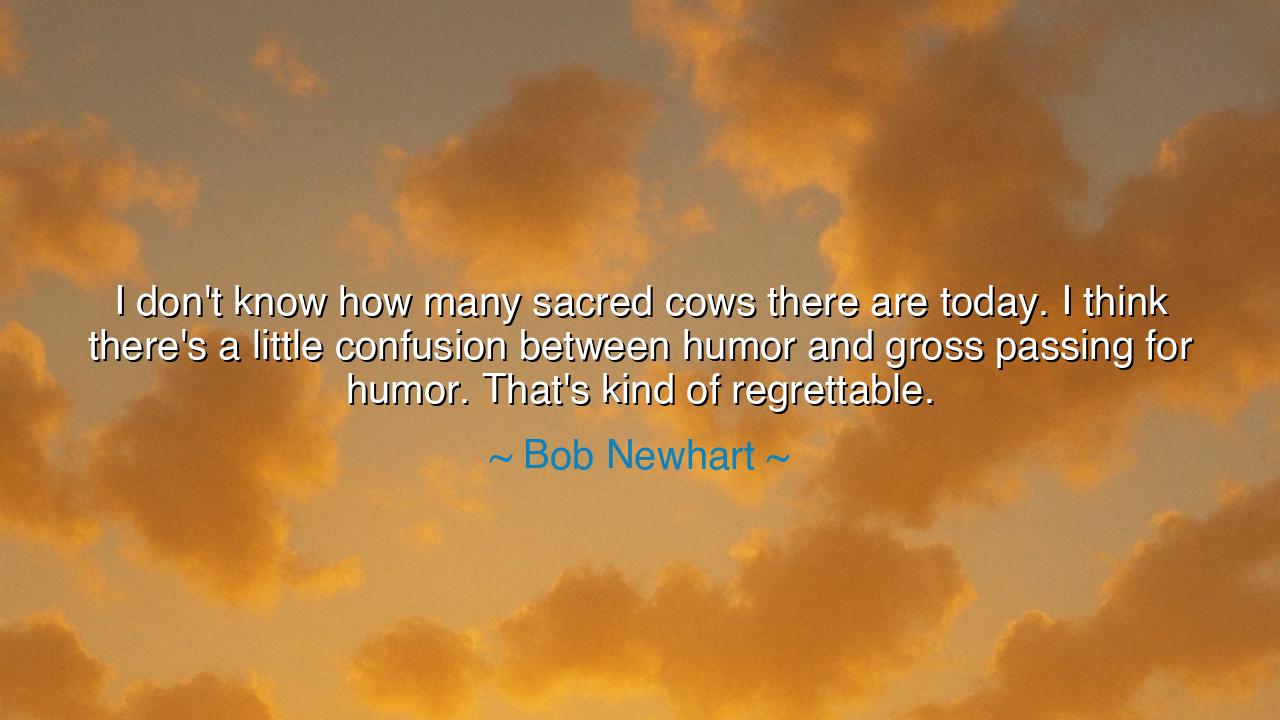
I don't know how many sacred cows there are today. I think
I don't know how many sacred cows there are today. I think there's a little confusion between humor and gross passing for humor. That's kind of regrettable.






In the grand tapestry of life, there are moments when the true nature of humor becomes clouded, when what is genuine and enlightening is overshadowed by what is crude or superficial. Bob Newhart speaks to this truth when he says, "I don't know how many sacred cows there are today. I think there's a little confusion between humor and gross passing for humor. That's kind of regrettable." These words reflect a deeper understanding of comedy—one that seeks to elevate the spirit rather than indulge the base instincts. The sacred cows Newhart refers to are the taboos, the sacred things we hold in reverence in our culture, and humor, when used wisely, can challenge or illuminate them. Yet, when humor descends into grossness, it not only distorts the truth but also betrays the very purpose of laughter.
Consider, children, the ancient Greeks, who held humor in high regard, not as a mere means of entertainment, but as a tool for wisdom and reflection. The great Aristophanes, a master of comedy, used his plays to challenge the power structures, to question the gods, and to expose the contradictions within society. His humor was sharp, yes, but it was never crude for the sake of crude. It sought to illuminate the follies of those in power and the absurdities of the world, lifting the audience to a higher understanding. Aristophanes's humor did not wallow in grossness but rather used laughter as a means to encourage change, to foster thought, and to deepen understanding.
In the time of Rome, the wise philosopher and statesman Cicero similarly understood the power of humor, though his humor was often subtle and rooted in intellect. Cicero spoke of eloquence and the power of speech to move people to action, but he also understood that humor was a vehicle for wisdom. It was a means to expose truth in a palatable way, not through vulgarity, but through wit and irony. Just as Newhart laments the loss of genuine humor, so too did Cicero recognize that humor’s true value lay not in gross displays, but in its ability to provoke thought and reflection. Humor, when wielded by the wise, has the power to change minds and elevate society.
The Renaissance, too, was a time when humor was regarded not merely as a form of entertainment but as a vehicle for reform and enlightenment. Erasmus, the great scholar and humanist, used satire to challenge the social and religious practices of his day. His works, full of sharp humor and wit, aimed to expose the flaws in society, to hold a mirror up to its vices, and to provoke the introspection that would lead to change. His humor was never meant to offend for the sake of offense, but to provide a critique of the world that would elevate the mind, not degrade it. In this, Newhart’s words echo the ancient wisdom: humor should be a force for illumination, not a tool for crudeness or harm.
In our own time, we see the influence of gross humor—humor that seeks to shock, to offend, to stir up the basest of reactions. It is the kind of humor that thrives on shock value, on taboos broken not to challenge ideas, but to provoke mere reaction. Newhart's lament is that in the quest to entertain, we have lost the higher calling of humor—the ability to provoke thought, to uplift, and to challenge with grace. When humor becomes gross, it undermines its own power. It no longer serves to make us better, to provoke reflection, but simply to fill the moment with fleeting laughter that leaves no lasting impression.
Ah, children, the lesson is clear: humor has always had a sacred role in the shaping of society. It is a tool not for evading truth, but for exposing it. We must learn to embrace the humor that seeks to elevate, that challenges our assumptions and makes us look at the world through new eyes. Just as Aristophanes and Cicero used humor to provoke thought, so too must we use humor as a means to challenge, to question, and to reform. Do not let gross humor become the dominant force, for in its wake lies only the decay of insight. Instead, cultivate humor that is sharp, that elevates, and that speaks to the deepest truths of our human condition.
So, children of the earth, when you choose to laugh, let it be with purpose. Choose humor that illuminates, that uplifts, and that brings us closer to understanding the world in all its complexities. Let laughter be a tool for growth, not a tool for destruction. The true gift of humor lies not in its ability to provoke crude reactions, but in its ability to help us see more clearly, to challenge the sacred cows of society, and to find wisdom in even the most absurd of places. Embrace humor with integrity, and let it guide you to a life of greater understanding and purpose.






AAdministratorAdministrator
Welcome, honored guests. Please leave a comment, we will respond soon